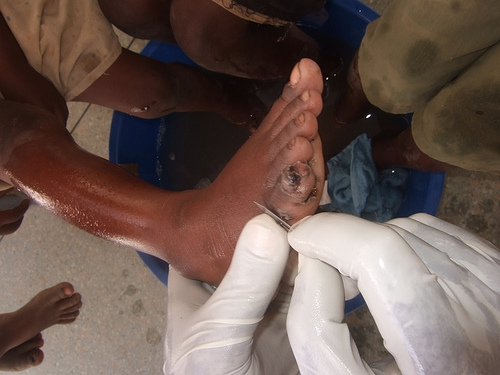When talking about Africa, many people still wax lyrical about vast, empty savannahs, The Lion King, flies, drums and naked women. And then they share their fears of violence, disease and crime.
By far, my greatest fear in Kenya is Njeri.
She’s the mobile “beauty therapist” who makes sure my lady bits – and those of many other expats and foreigners – are under control. Call her anytime you need her and she’ll take a matatu (taxi) and come to wherever you are, with her equipment.
When she arrives at my house she immediately sets to work. She puts her pot of wax – which she’s made with sugar, water and lemon juice – on the stove, and takes off her top. The heat along the Kenyan coast is brutal and standing over a hot stove with no fan or air-conditioning is hard work.
The process is the same every time: Njeri tells me to place an old sheet on the bed and to drop my pants and lie down on it. Then she politely asks me to spread my legs.
She moves the boiling hot pot from the stove to the bed, places it between my legs, and tells me not to move. She dips an old rusted butter knife into the pot and blows on it in a feeble attempt to cool the wax slightly. Then she spreads hot wax, like butter on toast, onto my lady bits. I can’t move or scream without knocking over the pot between my legs. I have to stay deadly still and scream on the inside.
Njeri then takes a scrap of material that she cut up the night before. Her wax strips are cuts of fabric from old bed sheets, clothes, jeans, whatever she can get her hands on. She spreads it over the hot wax, rubs up and down, and starts making clicking, clucking noises and shaking her head.
It’s her way of preparing her client for the pain to come.
She rips the fabric and wax off my bits, and immediately pats my skin and shushes me, like a mommy placating a crying baby.
“Oh, shhhhh, shhh, shhhhhh.”
And she does it all over again. Once she has used up a strip of fabric she throws it on the bedroom floor, for me to walk around collecting afterwards.

When she is done, it’s time for my legs. Half an hour later she showers my body with baby powder and tells me what a good girl I’ve been. She puts her hand out for her 400 Ksh (about R40) and heads out, leaving me on my bed, still sticky with remnants of wax, surrounded by strips of dirty fabric, and covered in powder.
Fast forward to the evening.
When my husband gets back from work, I tease him a little and tell him about my bikini wax. He doesn’t need much teasing and follows me into the room. Just as things are getting hot and heavy, Disco, our psycho cat (named such because she fell out of the thatched roof of the local bar and landed head-first on the dance floor), attacks me.
Turns out there is a stand of string from Njeri’s fabric strips still stuck to my butt. At first I didn’t realise that it was Disco who was clawing at me to get to it … so I scream.
I’m on my husband, the cat is on me, and in an epic climax (not quite the one I had in mind), in runs the security officer with his rungu (wooden baton) because he’d heard the commotion and thought something was wrong.
So much for a romantic night with my man.
Bash, from South Africa, is a freelance project development analyst based in Kenya. She spends most of her time snorkelling, is obsessed with giraffes, has too many tattoos and loves travelling.



